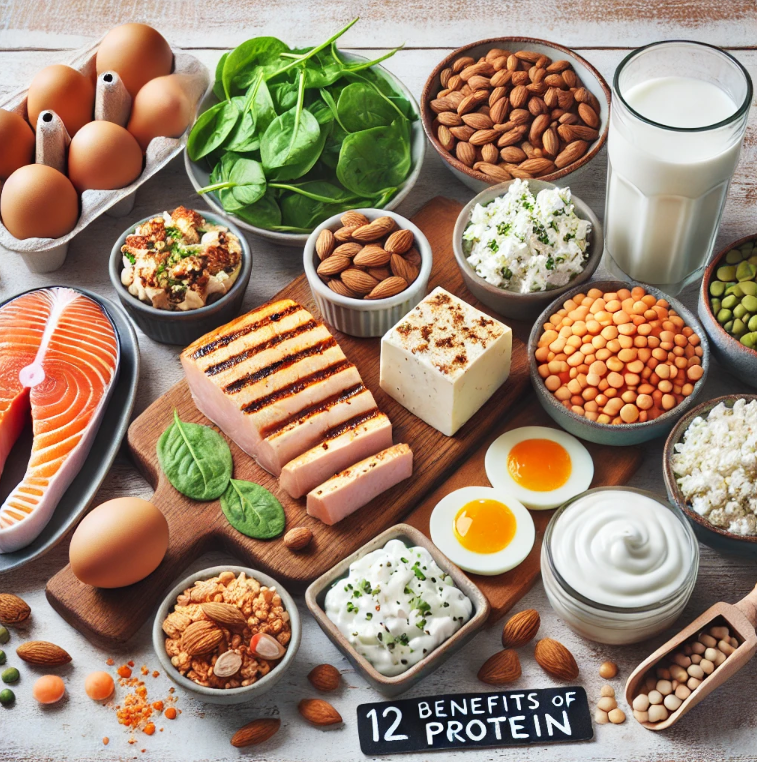Losing weight can be a challenging journey, but one key factor often overlooked is the role of protein. Protein is not just for bodybuilders; it’s essential for everyone striving to achieve sustainable weight loss. Here’s why protein matters and how you can incorporate it into your weight-loss journey effectively.
What Is Protein and Why Does It Matter?
Protein is a macronutrient that repairs tissues, supports muscle growth, and boosts overall body functions. But for weight loss, its most crucial benefit is that it keeps you feeling full, reducing the urge to overeat.
12 Benefits of Protein
- Boosts metabolism.
- Reduces hunger.
- Supports muscle retention.
- Promotes fat loss over muscle loss.
- Helps balance hormones.
- Improves bone health.
- Enhances recovery post-exercise.
- Regulates blood sugar.
- Provides sustainable energy.
- Reduces cravings.
- Improves sleep quality.
- Supports mental clarity.
How Eating More Protein Changed My Body
Increasing protein intake can lead to noticeable changes. For many, it reduces bloating, promotes lean muscle growth, and results in a steady energy supply throughout the day.
Does Protein Burn Fat Without Exercise?
Protein can aid fat loss even without exercise by boosting your metabolism and suppressing hunger. However, combining it with regular activity amplifies results.
How Much Protein Do I Need?
Your protein requirement depends on factors like weight, age, and activity level. Use a protein weight loss calculator to determine your daily needs accurately.
| Body Weight | Daily Protein Need (Grams) |
|---|---|
| 120 lbs | 60–90 g |
| 150 lbs | 75–112 g |
| 180 lbs | 90–135 g |
7-Day Protein Diet Plan for Weight Loss
Here’s a sample week-long plan packed with high protein foods:
| Day | Breakfast | Lunch | Dinner |
|---|---|---|---|
| Monday | Scrambled eggs & spinach | Grilled chicken salad | Baked salmon & quinoa |
| Tuesday | Greek yogurt & berries | Turkey wrap | Lentil soup |
| Wednesday | Protein smoothie | Grilled tofu & veggies | Beef stir-fry |
| Thursday | Cottage cheese & nuts | Chicken Caesar salad | Shrimp & brown rice |
| Friday | Oatmeal with protein powder | Grilled tuna sandwich | Chickpea curry |
| Saturday | Boiled eggs & avocado toast | Pork loin & sweet potato | Grilled fish tacos |
| Sunday | Almond butter smoothie | Chicken stir-fry | Eggplant Parmesan |

How to Increase Protein Intake for Weight Loss
- Add a protein source to every meal.
- Snack on nuts, seeds, or boiled eggs.
- Use protein powder in smoothies.
- Include plant-based proteins like lentils and chickpeas.
- Opt for high-protein snacks.
Disadvantages of High-Protein Diet
While protein is essential, consuming too much can have drawbacks, such as:
- Strain on kidneys.
- Dehydration.
- Nutrient deficiencies.
- Increased risk of heart disease if protein comes from fatty meats.
FAQs About Protein for Weight Loss
1. Does protein help with weight loss for females?
Yes, protein is highly effective for weight loss in females, promoting fat loss while preserving lean muscle.
2. Can I use a protein weight loss calculator?
Absolutely! It’s a great way to personalize your protein intake based on your weight and goals.
3. What are some high-protein foods?
Eggs, chicken breast, lentils, tofu, fish, and Greek yogurt are excellent options.
4. Does protein burn fat without exercise?
Protein supports fat loss by boosting metabolism and reducing hunger, but results improve significantly with exercise.
5. What’s the best 7-day protein diet plan for weight loss?
Follow the balanced plan above, which includes diverse, high-protein foods for sustainable results.
Incorporating protein for weight loss female strategies can transform your journey. Use these tips, monitor progress, and adapt to find what works best for you.


